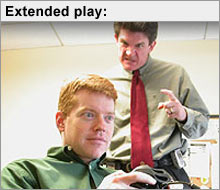
|
|
Want more gaming news and commentary? Click the glazed eyes.
|
|
NEW YORK (CNN/Money) � Looks like the NFL was just the beginning.
When Electronic Arts signed an exclusive licensing deal with the NFL and its players association last month, you didn't have to be an expert to know that the fight was on for similar deals with other sporting leagues. Now Take Two Interactive has stepped up to the plate and locked in a deal of its own.
The publisher has signed a semi-exclusive deal with the Major League Baseball Player's Association. The seven-year deal, which begins in 2006, will preclude third-party video game publishers (including EA) from using the likeness of any Player's Association member. Take Two has yet to seal a deal with Major League Baseball for rights to team names, stadiums and other assets.
While you have to give Take Two credit for staying in the fight for the sports genre, it's questionable whether this deal was a wise move.
In the world of video games, baseball is far from the national pastime. Football is where the bragging rights are � and where the money's at. In 2004, baseball games took in $93 million at retail. Football titles took in more than four times that amount � generating $384 million in sales, according to Banc of America analyst Gary Cooper.
And by only sewing up third-party rights, that leaves a big loophole. Microsoft (which owns the much-praised "High Heat" franchise), Sony (which has an internal development team specializing in sports games) and Nintendo can still make their own games. And it's quite possible that EA would work in tandem with a console publisher to develop a game.
Even if it chose not to go that road, there are some prominent MLB players who don't belong to the Player's Association � such as Barry Bonds and Kevin Millar. By putting the marketing focus on a cover athlete, EA could create a baseball game that centers on mostly fictional players. It'd be a long shot to succeed, but not completely out of the realm of possibility.
"In Europe, Electronic Arts (Research) has FIFA [soccer] wrapped up, but Konami's Pro Revolution soccer has still been a good selling game," said P.J. McNealy of American Technology Research. "It's not impossible."
Still, Take Two has seemingly struck a blow with the deal. EA's "MVP Baseball" was last year's top baseball title, selling over 1.3 million copies. That's not an insignificant amount, but it's not really a breadwinner.
Which raises the question: Why would Take Two (Research) pay such a premium for the MLB Players Association rights? The Wall Street Journal reports the company agreed to pay a licensing fee between $80 million and $90 million � and said the union considers the overall value of the deal to be closer to $150 million.
If those numbers are accurate, was the deal worth it?
"We believe that Take-Two overpaid for the license given the lack of exclusivity and relatively small size of the baseball category," said Cooper in a research note. "The only winners here are the Players Association due to the size of the minimum guarantees, and first-party publishers due to the lack of future competition from EA Sports in the baseball genre."
For discussion purposes, let's say Take Two and MLB do strike an agreement. The consumer is really no worse off, since competition will still exist. And should EA or another publisher assist Microsoft (Research) or Sony (Research) in making a game, it will be in a good position to bid for the rights when they become available again, since it would have kept its player renders (the lifelike animated facial models that make the games more realistic) up to date. (Creating athlete likenesses is one of the biggest expenses in sports games.)
For now, though, there's still one piece of low-hanging fruit in the sports genre: The NBA.
It's a particularly juicy piece. NBA video games are the industry's second most popular sports games. And if the league wasn't considering some sort of exclusivity before, it certainly is now, having seen the rabid bidding wars going on.
A smart way for the NBA to proceed might be to dole out two types of licenses � one for true sports simulations and one for exaggerated action. In other words, let one developer build a game that follows NBA rules and lets the player hit the hardwoods to compete against the pros. Meanwhile, allow a second developer to focus on street games or arcade-style titles.
Not only would this give consumers two distinct playing styles, it would ensure that two different publishers were keeping their NBA game engines � and character models - up to date. That way, when the contracts expire, there's real competition for the bidding rights.
The league wins, the players win � and more importantly, the consumer wins.
Morris is Director of Content Development for CNN/Money. Click here to send him an email.

|